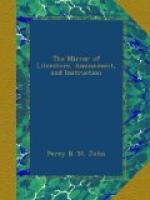“The battle continued to rage, but with disadvantage to the English. The Scottish archers had now an opportunity of galling their infantry without opposition; and it would appear that King Edward could find no means of bringing any part of his numerous centre or rear-guard to the support of those in the front, who were engaged at disadvantage.
“Bruce, seeing the confusion thicken, now placed himself at the head of the reserve, and addressing Angus of the Isles in the words, “My hope is constant in thee,” rushed into the engagement followed by all the troops he had hitherto kept in reserve. The effect of such an effort, reserved for a favourable moment, failed not to be decisive. Those of the English who had been staggered were now constrained to retreat; those who were already in retreat took to actual flight. At this critical moment, the camp-followers of the Scottish army, seized with curiosity to see how the day went, or perhaps desirous to have a share of the plunder, suddenly showed themselves on the ridge of the Gillies’-hill, in the rear of the Scottish line of battle; and as they displayed cloths and horse-coverings upon poles for ensigns, they bore in the eyes of the English the terrors of an army with banners. The belief that they beheld the rise of an ambuscade, or the arrival of a new army of Scots, gave the last impulse of terror, and all fled now, even those who had before resisted. The slaughter was immense; the deep ravine of Bannockburn, to the south of the field of battle, lying in the direction taken by most of the fugitives, was almost choked and bridged over with the slain, the difficulty of the ground retarding the fugitive horsemen till the lancers were upon them. Others, and in great numbers, rushed into the river Forth, in the blindness of terror, and perished there. No less than twenty-seven Barons fell in the field; the Earl of Gloucester was at the head of the fatal list: young, brave, and high-born, when he saw the day was lost, he rode headlong on the Scottish spears, and was slain. Sir Robert Clifford, renowned in the Scottish wars, was also killed. Two hundred Knights and seven hundred Esquires, of high birth and blood, graced the list of slaughter with the noblest names of England; and thirty thousand of the common file filled up the fatal roll.




